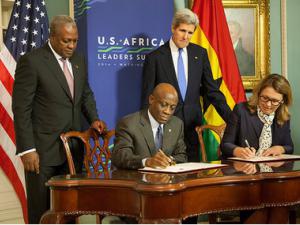President John Mahama said a fiscal injection from the International Monetary Fund will be useful to bolster the economy, giving the first indication the government may seek a loan from the lender.
Speaking in an interview in New York yesterday, Mahama, said he expects to sign a three-year program with the Washington-based lender.
An IMF team arrived in Ghana last week to begin talks on possible aid, though no detail has been disclosed if that will entail loans or technical support.
“When implementing a program it helps to get a fiscal injection,” Mahama said. “One of the major features of our economic difficulty has been a reduction in our external reserves. In a situation like that, some fiscal injection from the IMF to stabilize the central bank and stabilize the reserve situation is useful.”
Ghana’s budget deficit has spiraled since 2012 as the government failed to curb election-related spending and a rising wage bill, while revenue fell. That’s prompted credit-rating companies to downgrade the nation’s debt and caused the cedi to lose a third of its value against the dollar this year, making it the worst-performing currency in sub-Saharan Africa.
“In doing the program, we’re looking not only for fiscal consolidation, but we’re looking for a transformation of our economy,” Mahama said. “We’re looking for institutional reform, we’re looking to strengthen the public-service sector.”
Economic Prospects
The government spends 70 percent of annual tax income on wages and may need to cut public sector jobs to help rein in the budget deficit, he said. Ghana has about 600,000 civil servants in a population of 24 million. “We imposed a net freeze on employment into the public sector in order to bring down the public sector numbers,” Mahama said.
The sale of $1 billion in Eurobonds days before the IMF arrived has boosted foreign-exchange reserves and revived investor confidence in an economy that depends on income from cocoa, gold and oil. Ghana is targeting a fiscal gap of 8.8 percent of gross domestic product this year, while Fitch Ratings expects the shortfall to exceed 10 percent of GDP for a third consecutive year.
Prospects for the economy and currency are set to improve as gas and oil projects come onstream, Mahama said. About $250 million of the proceeds from the Eurobond sale will help finance an infrastructure fund, which will be a “game-changer” for the economy, he said.
Cedi Gains
The cedi rose 3.4 percent to 3.2 against the dollar as of 12:30 p.m. in Accra, the capital.
Mahama heads the National Democratic Congress, one of two main political parties in Ghana, and was sworn in as leader after the death of John Atta Mills in 2012. The former communications minister won elections later that year. During his campaign, he pledged to narrow the budget deficit and maintain growth at 8 percent annually.
Ghana became an oil exporter in 2010, pushing growth to the fastest pace in Africa at 14.4 percent. Tullow Oil Plc (TLW) pumps about 100,000 barrels of crude a day at the Jubilee field.
Economic expansion is forecast by the IMF at 4.8 percent this year and 5.4 percent in 2015.
Click to view details



Business News of Wednesday, 24 September 2014
Source: Bloomberg

















